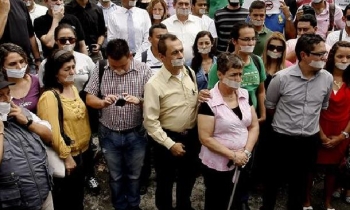The new media law in Belarus contains several provisions that further deteriorate the media situation in the country.
In particular, the law provides for regulation of online media by a governmental decree and re-registration of all the media outlets; it simplifies the procedure of closing down a media outlet and decreases the level of security of journalists and editorial boards, according to the Belarussian Association of Journalists (BAJ). Courts now can clÂose down media after two warnings issued for any kind of violation. Reprinting articles from other media as well as publishing materials from political parties or NGOs, which can ‘discredit the Republic of Belarus’ or abuse someone, will not exempt a publication from liability.
BAJ, in fact, notes that elaboration of a governmental decree on online media regulation has been stopped, but still this provision remains in the law. Re-registration of media outlets will be conducted upon request, which is a positive moment.
There are some other positive signs that can be noted, namely:
- Returning of two independent newspapers, Narodnaya Volia and Nasha Niva, to state press distribution systems and returning of Narodnaya Volia to a Belarusian printing house;
- holding two round table sessions with participation of editors and journalists of non-state media and BAJ representatives that favoured open discussion of media problems.
These steps can be regarded as demonstration of movement of the Belarusian authorities towards meeting the requirements of the European Union.
Nevertheless, BAJ believes, no real changes of the situation with media and the freedom of expression in Belarus have been noted so far.
The authorities still keep the monopoly on the majority of printed and electronic media as well as systems of printing and distribution. The state-owned media are still regarded by the authorities as a part of governing mechanism that conducts a propaganda function.
At the same time, the policy of the Belarusian authorities is still aimed at excluding the independent media from the information sector, primarily by economic discrimination, and restriction of journalists’ access to the information sources. 13 independent publications still remain out of state press distribution systems. The Law “On Counteraction to Extremism†is still implemented to restrict the freedom of expression.
All these facts are taking place at the time when there are attempts to establish a dialogue between Belarus and Europe. BAJ keeps stating that a real dialogue is not possible without ensuring the freedom of expression in the country and real improvements of the media situation in Belarus.
"Belarus media requires invigorating reform, not a new media law that merely turns the screw ever tighter on the independent media," says Aidan White, IFJ General Secretary. IFJ says that last minute softening of the legislation and the recent return of two independent newspapers to state distribution system do not disguise the harsh reality that "Belarus journalists are the most oppressed in Europe."
"The key problems of journalism in Belarus remain unsolved," says Zhanna Litvina, Chair of BAJ. "The state retains a monopoly on printed and electronic media, distribution systems and printing facilities. They regard media as a part of the official administration that has to perform propaganda functions."
The criteria of improvements in the field of the freedom of expression, according to BAJ, are:
- Ensuring equal economic conditions for media outlets with different forms of ownership, and first of all returning all independent newspapers to the system of Belsayuzdruk, Belposhta state subscription catalogue and Belarusian printing houses, and inadmissibility of printing and distribution restrictions in future.
- Ensuring real access to information, in particular:
- abolishing articles of the Belarus’ Law «On State Service» and provisions of other legislation acts that limit the journalists’ right to access information about the authorities’ activities;
- guaranteeing the freedom of accreditation of correspondents and the opening of offices of foreign media as well as the introduction of accreditation scheme upon request;
- unacceptability of cases of refusals by state officials to provide journalists with information.
- Bringing national media legislation in accordance with international standards, in particular:
- bringing the Belarus’ media-related legislation (in particulÂar, the Law «On the Media» and the Law «On Counteraction to Extremism») and its implementation in line with international stanÂdards;
- abrogating five articles of the Criminal Code, specifically Article 367 «Calumny in relation to the PresidenÂt of the Republic of Belarus», Article 368 «Insult of the President of the Republic of Belarus», Article 369 «Insult of the representative of the authorities», Article 369–1 «Discredit of the Republic of Belarus», and Article 193–1 that deals with activities on behalf of non-registered organizations, with further decriminalisation of defamation.
BAJ is sure these steps will foster improvement of the current situation with the freedom of expression and independent media in Belarus as necessary conditions for development of a democratic country.









